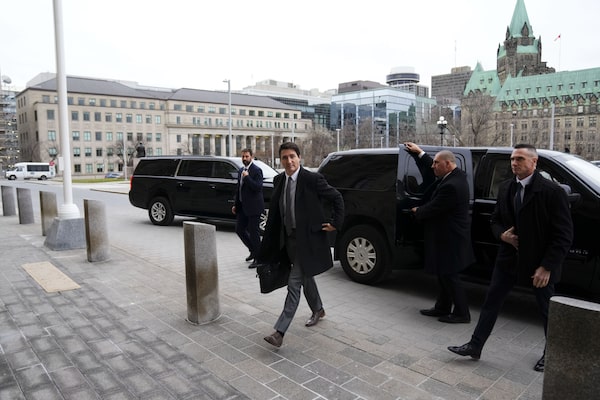
Prime Minister Justin Trudeau arrives to a cabinet meeting on Parliament Hill in Ottawa on Nov. 29.Sean Kilpatrick/The Canadian Press
Prime Minister Justin Trudeau says he doesn’t want a fight with Alberta over its sovereignty act – but he isn’t ruling out options for dealing with it.
Alberta Premier Danielle Smith tabled the bill, formally titled the Alberta Sovereignty Within a United Canada Act, on Tuesday, prompting immediate criticism from legal experts, Indigenous groups, political opponents and a major Calgary business group.
The legislation would, among other measures, give the province’s cabinet the ability to rewrite laws and order government agencies, police, cities and universities to disregard federal legislation that the Alberta government deems unconstitutional or harmful to the province.
Mr. Trudeau acknowledged the swift reaction to the bill but wouldn’t say what, if anything, his government would do in response.
“We know that the exceptional powers that the Premier is choosing to give the Alberta government and bypassing the Alberta legislature is causing a lot of eyebrows to raise in Alberta, and we’re going to see how this plays out,” Mr. Trudeau told reporters in Ottawa. “I’m not going to take anything off the table but I am also not looking for a fight.”
The Prime Minister said the government will closely consider the implications of the legislation.
This bill was the cornerstone of Ms. Smith’s successful bid to lead the United Conservative Party. Most of her leadership rivals, including people now in her cabinet, denounced the proposal, as did her predecessor Jason Kenney, who characterized the sovereignty act as a “cockamamie idea” and a “de facto” plan for separation.
The bill would allow the legislature to pass a motion, identifying federal measures (including proposals that have not yet been enacted) as unconstitutional or “harmful” to Alberta while outlining how the government should respond. Cabinet would then have several options, including the ability to amend legislation by order in council rather than going through the assembly.
Bruce Ryder, an associate law professor at York University’s Osgoode Hall Law School in Toronto, said the legislation is an “assault on the supremacy of the Constitution.” He added the bill, as written, is no “master-class in legislative clarity,” prompting more questions than answers.
For example, the proposed law states that nothing in the act will breach the Constitution but also says that a provincial order would prevail if there was any conflict or inconsistency with a directive to a provincial entity, like a school or regional police service.
“A federal law will prevail over provincial law or provincial order in the case of conflict,” said Mr. Ryder. “If the government is exercising the power to unilaterally decide whether federal law is valid and then directing provincial entities whether or not to comply with it, then insisting that their order prevails over the federal law – all of those things are unconstitutional.”
On Wednesday, the province reiterated that cabinet would only be authorized to amend legislation after a motion in the legislature, and said that if there was a dispute, it could be settled by the courts.
Eric Adams, a law professor at the University of Alberta specializing in the Constitution, said it appears the government is trying to suggest there are guardrails in place to limit unilateral powers but that the envisioned authority of cabinet remains “extraordinary in its breadth and puzzling in its necessity.”
He said it is akin to Henry VIII clauses, which give power to the government’s executive branch to make laws, bypassing the law-making process and associated scrutiny.
Calgary Mayor Jyoti Gondek said she was waiting for legal advice and additional information from the provincial government to understand the act, which she called “unnerving.” She added there was no consultation with the city before its introduction.
“Our economy is at a place where we’re ready to rebound, but the more disruption you throw at us, the worse it makes it for people who wish to invest in our city,” said Ms. Gondek. “The sovereignty act, which is completely undefined right now, really puts us into a tailspin.”
The president of the Calgary Chamber of Commerce, Deborah Yedlin, said the sovereignty act will hurt Alberta’s reputation, create investment uncertainty and make it difficult for the province to attract capital and young workers.
In Alberta’s Question Period on Wednesday, New Democratic Leader Rachel Notley called the act a “full-throated power grab from Albertans” and pushed Ms. Smith to withdraw the legislation and focus on what really matter to residents.
Ms. Smith replied that the Opposition party – which voted against the first reading of the act – should support it because Albertans want to push back against Ottawa, before pointing to a referendum where Albertans voted against equalization.
Federal Conservative Leader Pierre Poilievre did not weigh in on the sovereignty act on Wednesday and his office did not respond to a request for comment.
Quebec Conservative MP Gérard Deltell encouraged Albertans to make the most of opportunities within Canada’s Confederation, while his caucus colleague Garnett Genuis, an MP from Alberta, said it signalled shared frustrations of the federal Liberals.
Mr. Genuis pointed to Ottawa’s legislation for environmental assessments and oil tanker traffic that has thrown up roadblocks to the province’s development of its resources, as well as the view that other parts of the federation have benefited from transfer payments at Alberta’s expense.
During Question Period in Ottawa, New Democratic Party Leader Jagmeet Singh asked Mr. Trudeau what his plans were to ensure Ms. Smith does not use the sovereignty act to undermine Canadian laws.
In response, Mr. Trudeau said, “I can very much understand why so many Albertans are preoccupied with the Premier’s choice to bypass the legislature in order to advance her agenda.”
 Alanna Smith
Alanna Smith Ian Bailey
Ian Bailey